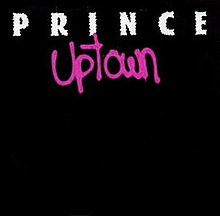
"The Arms of Orion" is a 1989 song by American musician Prince and Scottish singer and actress Sheena Easton. It was the third single to be taken from Prince's 1989 Batman soundtrack album. It was a #36 pop hit for them on the Billboard Hot 100 charts in 1989.

"1999" is a song by American musician Prince, the title track from his 1982 album of the same name. Originally peaking at number 44 on the Billboard Hot 100, a mid-1983 re-release later reached number 12 in the US, while a January 1985 rerelease, a double A-side with "Little Red Corvette", later peaked at number 2 in the UK.
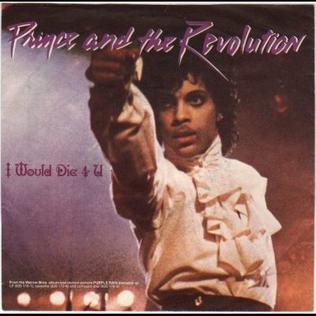
"I Would Die 4 U" is a song by Prince and the Revolution, the fourth single in the US from their 1984 album, Purple Rain. The up-tempo dance song was a top 10 hit—the final one from the album—in the US, reaching number 8 on the Billboard Hot 100.

"Let's Go Crazy" is a 1984 song by Prince and The Revolution, from the album Purple Rain. It is the opening track on both the album and the film Purple Rain. "Let's Go Crazy" was one of Prince's most popular songs, and was a staple for concert performances, often segueing into other hits. When released as a single, the song became Prince's second number-one hit on the Billboard Hot 100, and also topped the two component charts, the Hot R&B/Hip-Hop Songs and Hot Dance Club Play charts, as well as becoming a UK Top 10 hit. The B-side was the lyrically controversial "Erotic City". In the UK, the song was released as a double A-side with "Take Me with U".

"Little Red Corvette" is a song by American recording artist Prince. The song combines a Linn LM-1 beat and slow synth buildup with a rock chorus, over which Prince, using several automobile metaphors, recalls a one-night stand with a beautiful promiscuous woman. Backing vocals were performed by Lisa Coleman and Dez Dickerson; Dickerson also performs a guitar solo on the song.

"Sign o' the Times" is the lead single from American musician Prince's 1987 studio album of the same name. The song was originally intended for two separate Prince studio albums meant to be released in 1986, both shelved: Dream Factory and Crystal Ball. Prince performed all vocals and instruments on the song. "Sign o' the Times" was reportedly written and composed on a Sunday, when Prince usually wrote his most introspective songs.
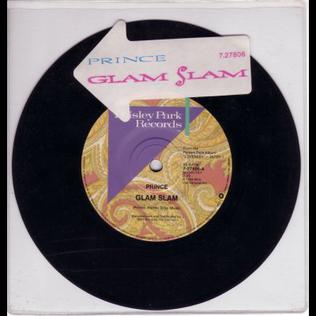
"Glam Slam" is a song by American musician Prince, and the second single from his tenth album, Lovesexy (1988). The song has sexual overtones with a spiritual undertone and fits the Lovesexy theme of integrating God and sex. The song is complex musically, recalling "Life Can Be So Nice" from Parade. It ends with a chorus of strings. A 12" single remix of the song by Shep Pettibone and Steve Peck mainly includes dance beats and extra instrumentation and samples.

"Take Me with U" is a song by Prince and the Revolution, and the final US single released from their album, Purple Rain (1984).
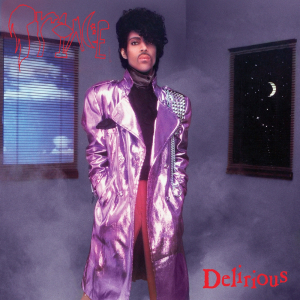
"Delirious" is a song by American musician Prince, from his fifth studio album album, 1999 (1982). It was the album's third single, and Prince's second Top 10 hit, reaching No. 8 in the US during the fall of 1983. The success of the single was boosted by the runaway success of the previous single, "Little Red Corvette", and also because DJs often played the first three album tracks in sequence, which just happened to be the order of the singles released from the album.

"Controversy" is a song by American musician Prince, the lead single and title track to his 1981 album. The song addresses speculation about Prince at the time such as his sexuality, gender, religion, and racial background, and how he could not understand the curiosity surrounding him.

"Let's Pretend We're Married" is a song by American musician Prince from his 1982 album 1999. It was the final US single from the album and peaked at number 52 in the US.
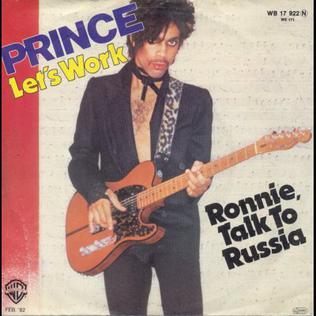
"Let's Work" is a song by Prince, released as the second single from his 1981 album Controversy. The song originates from a dance called "the Rock" that local kids were doing at the time in Minneapolis. Prince responded quickly with a track called "Let's Rock", and wished to quickly release it as a single. Warner Bros. refused, and a disappointed Prince did not include the song on Controversy, saying the phase had passed. Instead, the song was updated with new lyrics and possibly new music and became "Let's Work"—one of his most popular dance numbers.

"Why You Wanna Treat Me So Bad?" is the US follow-up single to Prince's first big hit, "I Wanna Be Your Lover". It is also Prince's first rock and roll-inspired single release. It did not make the top 40 of the Billboard Hot 100 charts, although it did reach #13 on the R&B Singles charts. The lyrics explore a relationship with a cruel lover. The song prominently features guitar and bass, with the keyboard featured in a less prominent role. A highlight of the song is a soaring guitar solo at the end, played by Prince himself.

"Still Waiting" was the third US single from Prince's second album, Prince. It was Prince's first ballad to be released as a single and was mildly popular on the R&B chart, reaching number 65. The ballad speaks from the perspective of a young man who has not yet found love but yearns for it. The track is mainly piano, acoustic guitar and synth-based and was often played live with extended instrumental solos and audience teasing. The song is a more traditional R&B ballad, before Prince established himself with trademark sexual romps like "Do Me, Baby" and "International Lover".
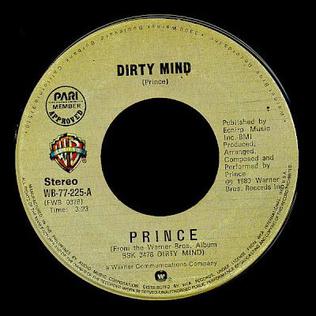
"Dirty Mind" is the follow-up single in the US, and title track to Prince's third album, released in 1980. The song is built around a keyboard riff created by Doctor Fink, which dominates the song. The demo-like song lacks a chorus, and is a stark departure of the smooth R&B sound of Prince's first two albums. The lyrics concern sexual thoughts, which are fairly representative of the other songs from the album. The single's B-side is the ballad "When We're Dancing Close and Slow", from the previous year's Prince. "Dirty Mind" reached number sixty-five on the soul chart. Along with the tracks "Uptown" and "Head", "Dirty Mind" reached number five on the dance chart.

"Gotta Stop (Messin' About)" is a song by Prince, released in the UK as a follow-up single to support his third album, Dirty Mind. The single was not an album track, though it was written at the same time, and possessed a similar sound. "Gotta Stop Messin' About" marked the first time Prince released non-album tracks, which, especially as B-sides, would become a prominent part of his career.

"Do It All Night" was the lead single in the UK to support Prince's third album, Dirty Mind. The song is an ode to sex, and Prince exclaims that he wants to do it all night. The song opens with a simple keyboard hook before a prominent bass guitar kicks in, along with rhythm guitar and live drums. The song consists of two verses and several repeats of the chorus. Also featured is a keyboard solo in the bridge. The song opened Prince's Dirty Mind tour. The B-side of the track was the controversial Dirty Mind ode to oral sex, "Head".

"Thunder" is a song by American musician Prince and the New Power Generation, from their 1991 album Diamonds and Pearls. It was issued as a limited, individually numbered 12-inch single picture disc in the UK and Ireland only, and the edited version was available only on the promotional single.
"Darling Nikki" is a song produced, arranged, composed, and performed by American musician Prince, originally released on his sixth studio album Purple Rain (1984). Though the song was not released as a single, it gained wide notoriety after Tipper Gore pointed out its sexual lyrics—in particular an explicit reference to female masturbation—and was responsible for the creation of the infamous Parental Advisory sticker. The song tells the story of a "sex fiend" named Nikki who seduces the singer.
"When You Were Mine" is a song written and released by Prince on his 1980 album, Dirty Mind. Though not released as a single, the song received a promotional 12" release. "When You Were Mine" was later the B-side for Prince's "Controversy" single in 1981.
